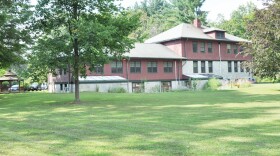Voters in the community of around 3,300 approved financial policies for the coming fiscal year, including Sheffield’s almost $8 million contribution to the Southern Berkshire Regional School district’s operating budget.
Berkshire County’s lack of housing was reflected in article 31 of the Sheffield town meeting warrant.
Planning board Chair George Oleen introduced it.
“Basically, what this does, it allows you to take, if you have an existing attached garage or other type building attached to your existing home, to make it into an auxiliary dwelling unit and also allows you – subject to all the other regulations in town, board of health etc. – to allow you to put in one additional ADU," Oleen told the audience. "[The] planning board did hold a public hearing on it and approved this article as amended.”
Select board member Rene Wood spoke in support of the article.
“We all have talked about the need for more housing in this town and how our young people leave and how young people don't come in and where do seniors go when they can no longer either wish or afford to stay in their home," said Wood. "Over the last year plus, the planning board has been working very diligently on expanding the number of housing options that are available, and this is the most significant one that they are bringing forward this year.”
Sheffield leaders also explained that the law explicitly forbids accessory dwelling units from being used as short-term rentals.
“On the planning board as part of our discussions, it was very important to us that that language be included, and that it specifically be written in such a way that would support long term occupancy for Sheffield residents and those who'd like to live here,” said planning board member Brittany Ebeling.
Voters overwhelmingly accepted the article with a 100 to 6 vote.
The 32nd and final article on the warrant concerned putting a ballot question before voters in November about implementing a 1% real estate tax aimed at raising community preservation funds.
“It is a tool that over 190 communities in the Commonwealth have adopted and it's something that we think Sheffield residents should be able to vote on. Most communities tend to use the vast majority of the money for housing. Sheffield is desperately in need of this," said Sheffield Land Trust Executive Director Kathy Orlando. “When we did the housing production plan, this was one of the recommendations that came out of that. When we heard from Stockbridge and Becket that what they're using their monies for, the vast majority and the reason that they did this, again, was housing. They've also been using it for municipal buildings, for churches, the steeple in Ashley Falls, their church, they're trying to raise money to do that. You can't do it for religious things, but you can do it for historic structures. So, this is a this is a tool that the residents of Sheffield should be able to vote on whether or not they want to do it.”
Select board chair Robert Kilmer disagreed.
“I'm not in favor of this proposal," he said. "I don't believe it's a good time for a new tax. I don't believe it's a good thing for people of low means to have to go to our assessor and be exempt from having to pay this tax. I do believe in open space, it’s great, and historical preservation and outdoor recreation, affordable housing, but that should come more through nonprofits and donations from people with means. I don't believe it should be a tax. Taxes should be meant for needs, not wants. For me this is not a necessity and not something that should be taxed.”
Sheffield resident Will Conklin is executive director of Greenagers, a South Egremont-based nonprofit that connects young people with work in agriculture, conservation, and other opportunities around sustainability and vocational skill building.
“I just wanted to share my own experience with these monies from other communities in my work with young people, and most specifically, with youth jobs and workforce development, that these monies in communities that have adopted it, use this money to create youth jobs in our communities, and also to use this money to leverage those very funds like nonprofits and other funds to put the whole package together to create what to my mind are desperate needs: housing and viable communities,” he said.
Voters passed the article with 87 yes votes to 19 no votes. Sheffielders will make the ultimate decision about implementing the 1% real estate tax for community preservation funds in November.










